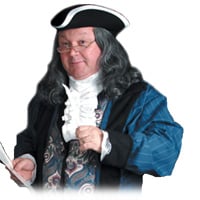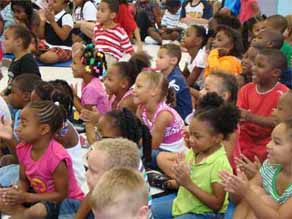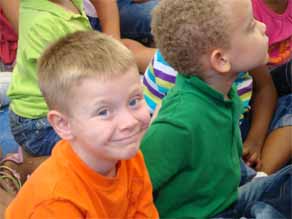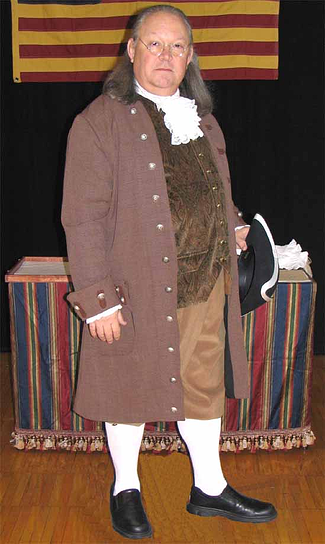
I have written several times in the past about one of our great school assembly performers Dave Mitchell. He presents our wonderful Ben Franklin school assembly as well as school assemblies on Math and Reading. Well, Dave is hard at work on a brand new program for next year, and yet found himself growing pensive about how and why we do the school assemblies that we do. He jotted down a few thoughts recently, and I thought I would share them with you.
"The Birth of a School Assembly Program
What makes us decide to do an assembly program on a given subject and how do we write, script, and prop it?
That is really a question that should probably be addressed in two offerings.
I will try to accomplish it in one. A school assembly program today is somewhat different than the assembly programs I grew up with in schools in Tennessee in the 50s and 60s. I remember everything from folk singers, to trained or “educated” horses, to clown and magic shows, chimpanzees to hypnotists, and liquid nitrogen demonstrations to beautiful drawings presented live using fluorescent colored sand and black lights. Oh yes, there were even more types of programs but many would have not been considered educational by today’s standards. With class time being valued so highly and budgets being somewhat limited, schools have to be very selective when it comes to deciding on an assembly program for their students. A program considered strictly entertainment is used now only on reward nights and even then schools seem to want to add some educational value to the presentation.
Being far ahead of its time, Mobile Ed has been providing the perfect combination of in depth educational content presented by performers who have been skilled in taking educational subjects and delivering them in a highly entertaining manner. For over 30 years, we have been using exciting and unusual props normally not found in the average classroom some of which cost into the tens of thousands of dollars. These props placed in the hands of presenters that have an entertainer’s personality give the assembly program the key elements that grab the attention of the students (and even the faculty) and drive home the message that can stay with the students a lifetime! This formula has been successful in thousands of schools in practically every state in the US. Why is this working and why has it worked for over three decades?
 First of all, we keep our ears to the ground and hear the buzz among educators and administrators all across the country. We analyze the reports from state standards and core educational expectations. Believe it or not it does change as far as its level of importance and significance over the years. As the nation evolves so does the need to address changes in our targets for addressing the needs of our young people. Although there will always be a need for assemblies featuring science, history, math, and reading, social needs are starting to demand assemblies that direct students to answers to problems in our environment, on character building, bullying, and many areas of social interaction.
First of all, we keep our ears to the ground and hear the buzz among educators and administrators all across the country. We analyze the reports from state standards and core educational expectations. Believe it or not it does change as far as its level of importance and significance over the years. As the nation evolves so does the need to address changes in our targets for addressing the needs of our young people. Although there will always be a need for assemblies featuring science, history, math, and reading, social needs are starting to demand assemblies that direct students to answers to problems in our environment, on character building, bullying, and many areas of social interaction.
After we see the need for programs that look at these problems and investigate ways to identify and deal with them, we gather resource information from specialists in these particular fields, many of whom have spent years studying and researching these areas. We gather information from these and other resources and begin to see common ground that offers explanation and solutions to these specific needs. We then seek out creative and exciting ways to present this information to students that will make a lasting impact on them. We want an assembly that makes an impression on them so strong that they hopefully they can tell their grand children about it.
Now for the challenge. All of this information and the unusual props must be able to be presented in a 45 minute time slot and be set up and broken down in an hour or less. It also has to be able to be presented in separate assemblies that allow students to be divided into at least two grade appropriate groups, usually 1st grade through third grade and fourth through sixth grade. And if possible an assembly that could be used in grades six through eighth grade. Addressing the need, identifying the problem and finding the solution to a particular subject is the easy part. Creating an assembly program that can excite students, teachers, and principals, stay in the 45 minute time frame and yet successfully explore the subject, and be set up and broken down in a timely manner, not to mention be affordable to most schools, fit in a van (sometimes with multiple other programs), and then find the right performer/educator that can properly deliver “the goods” and finally, to unite program with school…………..Now THAT’S the challenge!
Here at Mobile Ed we are grateful for the thousands of responses from principals, teachers, PTA and PTO leaders, and students that have said we have met that challenge and accomplished that goal. High costs of travel expenses, salaries, equipment, and a challenging economy have not deterred our purpose. It makes us more determined and more creative in order to offer you the best in school assemblies. You will find the largest selection of assemblies offered, more than any other resource available today and we are adding new programs as the need arises to assist schools in their efforts to educate and inspire our students across America."
I could not have said it better, Dave! Look for a great new school assembly program from Dave next year. He won't let me "bully" him, so I can't go into details yet, but we think it will be a "bully" good school assembly show!
Geoff Beauchamp is the Regional Manager of Mobile Ed Productions where "Education Through Entertainment" has been the guiding principal since 1979. Mobile Ed Productions produces and markets quality educational school assembly programs in the fields of science, history, writing, astronomy, natural science, mathematics, character issues and a variety of other curriculum based areas. In addition, Mr. Beauchamp is a professional actor with 30 years of experience in film, television and on stage. He created and still performs occasionally in Mobile Ed's THE LIVING LINCOLN






